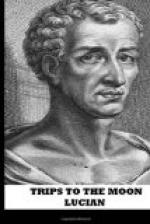{19a} This alludes to the Parthian War, in the time of Severian; the particulars of which, except the few here occasionally glanced at, we are strangers to. Lucian, most probably, by this tract totally knocked up some of the historians who had given an account of it, and prevented many others, who were intimidated by the severity of his strictures, attempting to transmit the history of it to posterity.
{19b} This saying is attributed to Empedocles.
{20a} The most famous of the Pontic cities, and well known as the residence of the renowned Cynic philosopher. It is still called by the same name, and is a port town of Asiatic Turkey, on the Euxine.
{20b} A kind of school or gymnasium where the young men performed their exercises. The choice of such a place by a philosopher to roll a tub in heightens the ridicule.
{21} See Homer’s “Odyssey,” M 1. 219.
{23} Alluding to the story he set out with.
{24a} [Greek]. Gr. The Latin translation renders it “octava duplici.” See Burney’s “Dissertation on Music,” Sect. 1.
{24b} Gr. [Greek], aspera arteria, or the wind-pipe. The comparison is strictly just and remarkably true, as we may all recollect how dreadful the sensation is when any part of our food slips down what is generally called “the wrong way.”
{25a} See Homer’s “Iliad,” [Greek] 1. 227, and Virgil’s “Camilla,” in the 7th book of the “AEneid.”
{25b} See Homer’s “Iliad,” [Greek] 1. 18. One of the blind bard’s speciosa miracula, which Lucian is perpetually laughing at.
{26} [Greek], or cerussa. Painting, we see, both amongst men and women, was practised long ago, and has at least the plea of antiquity in its favour. According to Lucian, the men laid on white; for the [Greek] was probably ceruse, or white lead; the ladies, we may suppose, as at present, preferred the rouge.
{29} Dinocrates. The same story is told of him, with some little alteration, by Vitruvius. Mention is made of it likewise by Pliny and Strabo.
{35} “His buckler’s mighty orb was next
displayed;
Tremendous Gorgon
frowned upon its field,
And circling terrors
filled the expressive shield.
Within its concave
hung a silver thong,
On which a mimic
serpent creeps along,
His
azure length in easy waves extends,
Till, in three
heads, th’ embroidered monster ends.”
See
Pope’s “Homer’s Iliad,” book
xi., 1. 43.
Lucian here means to ridicule, not Homer, but the
historian’s absurd
imitation of him.
{39} The Greek expression was proverbial. Horace has adopted it: “Parturiunt montes, nascetur ridiculus mus.”
{40} Lucian adds, [Greek], ut est in proverbio, by which it appears that barbers and their shops were as remarkable for gossiping and tittle-tattle in ancient as they are in modern times. Aristophanes mentions them in his “Plutus,” they are recorded also by Plutarch, and Theophrastus styles them [Greek].




